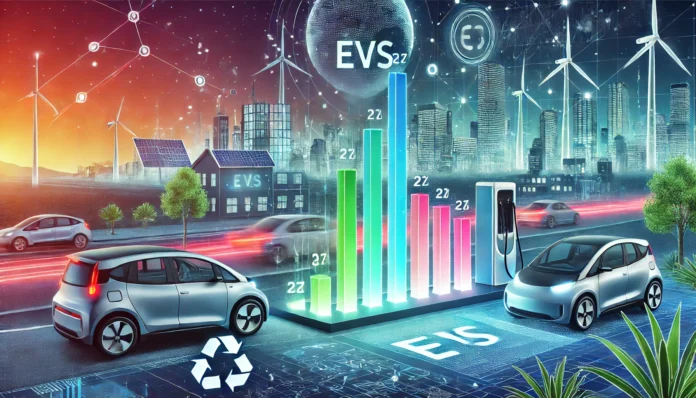
The automobile industry is undergoing a major transformation, with electric vehicles (EVs) emerging as the future of transportation. As the world moves towards sustainability, EVs are rapidly gaining popularity due to their eco-friendly nature, cost-effectiveness, and technological advancements.
Why Are Electric Vehicles (EVs) on the Rise?
1. Growing Environmental Concerns
One of the primary reasons behind the surge in EV adoption is the increasing awareness of climate change. Traditional gasoline and diesel-powered cars contribute significantly to air pollution and greenhouse gas emissions. EVs, on the other hand, offer zero tailpipe emissions, reducing carbon footprints and improving air quality.
2. Government Policies and Incentives
Governments worldwide are implementing policies to encourage EV adoption. Incentives such as tax credits, rebates, and reduced registration fees make electric cars more affordable. Additionally, many countries have announced plans to phase out internal combustion engine (ICE) vehicles in favor of electric alternatives.
3. Advancements in Battery Technology
The development of lithium-ion batteries has significantly improved the efficiency and range of EVs. Battery prices have dropped substantially, making electric vehicles more accessible. Innovations such as solid-state batteries and ultra-fast charging stations are further revolutionizing the industry.
4. Lower Maintenance and Running Costs
EVs have fewer moving parts compared to traditional vehicles, which means lower maintenance costs. There is no need for oil changes, exhaust system repairs, or complex engine maintenance. Moreover, the cost of electricity is significantly lower than gasoline, leading to substantial savings over time.
5. Expansion of Charging Infrastructure
One of the initial barriers to EV adoption was the lack of charging stations. However, governments and private companies are rapidly expanding charging networks, making it more convenient for EV owners to charge their vehicles at home, workplaces, and public locations.
Top Electric Vehicles Leading the Market
Several EV models are dominating the automotive market, providing a variety of options for consumers:
- Tesla Model 3 – One of the best-selling electric cars with impressive range and performance.
- Ford Mustang Mach-E – A stylish and powerful electric SUV.
- Nissan Leaf – An affordable and reliable EV with great efficiency.
- Chevrolet Bolt EV – A compact, long-range electric car.
- Hyundai Ioniq 5 – A futuristic EV with fast-charging capabilities.
Challenges Facing EV Adoption
Despite the growing popularity, some challenges remain:
- Initial Purchase Cost: Although prices are decreasing, some EVs still have higher upfront costs than gasoline-powered cars.
- Charging Time: While fast-charging stations are increasing, charging an EV still takes longer than refueling a traditional car.
- Battery Recycling and Sustainability: Proper disposal and recycling of used EV batteries remain a concern for environmentalists.
Global Surge in Electric Vehicle Adoption
In recent years, the adoption of electric vehicles has seen exponential growth worldwide. According to the International Energy Agency (IEA), nearly 14 million new electric cars were registered globally in 2023, bringing the total number on the roads to 40 million. This surge represents a 35% increase compared to the previous year, highlighting the accelerating shift towards electrification.
China, Europe, and the United States are leading this charge. China alone accounted for 11 million EV sales in 2024, a 40% increase from the prior year, representing nearly two-thirds of all worldwide sales. Europe followed with 3 million sales, accounting for 18% of new EVs, while North America recorded 1.8 million sales, just over 10% of global EV sales.
Challenges and the Road Ahead
Despite the remarkable progress, the transition to electric vehicles is not without challenges. Issues such as the need for widespread charging infrastructure, battery recycling, and the environmental impact of battery production remain pertinent. Additionally, the automotive industry faces geopolitical tensions and trade disputes that can influence production and sales dynamics. For instance, trade tensions have been cited as factors contributing to fluctuations in car production and sales in various regions.
Nevertheless, the trajectory for electric vehicles remains overwhelmingly positive. Projections indicate that EVs will account for an increasing share of the automotive market in the coming years. Bloomberg New Energy Finance forecasts that EVs will represent 10% of all new car sales by 2025 and 58% by 2040. This anticipated growth underscores the importance of continued investment in technology, infrastructure, and policy support to facilitate a seamless transition to electric mobility.
The Future of Electric Vehicles
With continuous advancements in technology and increasing consumer interest, the future of EVs looks promising. Autonomous driving, improved battery efficiency, and enhanced charging infrastructure will further boost adoption rates. Moreover, as automakers commit to all-electric lineups, traditional gasoline vehicles may soon become a thing of the past.
Conclusion
The rise of electric vehicles is revolutionizing the transportation industry. As the world moves towards a greener future, EVs offer a sustainable and cost-effective alternative to traditional cars. Whether you’re considering an electric vehicle for environmental reasons, financial benefits, or cutting-edge technology, now is the perfect time to make the switch.
Are you ready to embrace the future of mobility? Share your thoughts on electric vehicles in the comments below!






